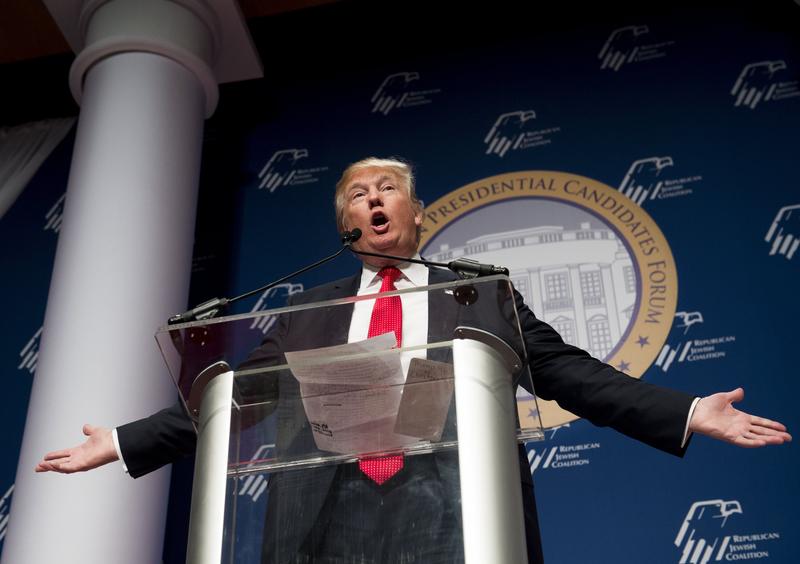BROOKE: Here’s a half truth for Politifact - one propagated at every opportunity by the exceptional Mr. Trump; and that is, that he’s way ahead in the polls. In fact, according to polling guru Nate Silver, the founder of the site fivethirtyeight, Trump is polling at maybe eight percent, if you figure that he has 25 percent of the 25 percent of self-declared Republicans.
SILVER: It's not that hard to get 6% or 8% of people to say much of anything in a poll. I mean 6% of people told Gallup a few years ago that they thought the moon landings were staged.
BROOKE: So, is there something that we should hold in mind the next time we see a poll that shows a significant share of people believing something that's demonstrably false?
SILVER: Well for one thing you want to keep in mind how many people are actually paying attention to that issue. If you poll about abortion, people at some point in their lives have probably given a lot of thought to abortion: the terms of the debate are somewhat clearly defined. That might not be true if you bring up something people have not devoted a lot of attention to and that sometimes we get some of these beliefs that might seem a bit funny, but the fact is that we are a country with a diverse range of opinions, including opinions that are not often said among the New York and DC media, and some of those things are politically incorrect about whether President Obama was born here for example, conspiracy theories --
BROOKE: And not just politically incorrect. I mean, it's wrong. You know. Obama was born here.
SILVER: For sure, but I think there are also people who when they're called to answer these polls would say I know Obama was born here, but I want to tweak the media a little bit giving those answers to troll people. Especially in some of these polls where you don't actually have another human being conducting the poll and you're just kind of answering to a robot. I think there probably are some people who give some responses as jokes, potentially.
BROOKE: Yeah, I mean, do you think that people are punking the media?
SILVER: I think there is some of that. And again, this is why the experiments where you see when people are actually paid to take polls their responses magically become more accurate because then you have an incentive other than kind of having fun with the pollsters. In some ways it's an odd question that pollsters are asking certainly about the election. To say who would you vote for in an election held today, well there's not an election held today and by the time there is, February 1st in Iowa, much later in other states, people have given a lot more thought to it and might be in a different frame of mind. In some ways it's appropriate for voters to be skeptical of a pollster when they're asking that kind of question this early.
BROOKE: Do the polls, when questioning the american public about its basic knowledge of basic things, and they come up with dismal results, can we believe them?
SILVER: Let me give you a complicated answer. First of all, if you have a high quality poll which means a poll that actually put in a lot of time and effort to reach people in different parts of the country that represent different demographic groups and not just a quick and dirty survey then it becomes more believable, but there are a lot of Americans who buy into ideas that are scientifically wrong. So I wouldn't suggest those beliefs aren't real, I do think that people tend to come to more correct beliefs when they have more on the line. So you see voters flirt with more extreme candidates or more eccentric candidates when they're asked to indulge months ahead of time who might i vote for and then they wind up picking some fairly serious conventional boring even politicians in the end.
BROOKE: [laughs] Now, you mentioned the moon landing. About half of the population thinks the other half of the population is just too plain stupid to vote responsibly. And I don't even care about Trump anymore. I really care about just the picture that polls give us about ourselves and whether that's true or whether it's a lie. There was a Washington Post ABC News poll on climate change this week, 51% of respondents wrongly said that there's "a lot of disagreement among scientists over the existence of global warming." One in four americans, according to a national science foundation poll out this year think that the sun revolves around the earth. What do you as a poll cruncher think when you see results like this?
SILVER: I think sometimes those numbers can be slightly exaggerated based on who you're actually getting in the survey. But we do have a country with a very very diverse range of opinions.
BROOKE: Right and I don't want to get all meta on you, but is it possible that people can hold two contradictory beliefs simultaneously?
SILVER: For sure! People are complicated, and I wish that when people cover the polls, they do a better job and realize that people have multiple concerns going on, but Americans have a history of nominating fairly sensible presidential candidates. You might not like their politics but you haven't had a lot of people like Donald Trump nominated in the end of the day.
BROOKE: Nate thank you very much.
SILVER: Definitely. Thank you.
BROOKE: Nate will be joining us regularly during this next year as the election season unspools. He's the founder and editor in chief of the data news site 538 and the author of the Signal and the Noise, Why So Many Predictions Fail But Some Don't.


